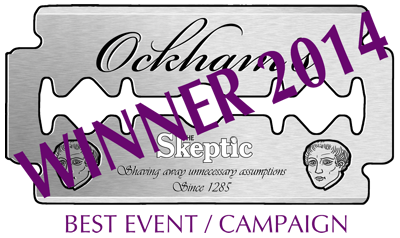Complementary and Natural Healthcare Council
The Complementary and Natural Healthcare Council (CNHC) was set up on the initiative of the now defunct Prince Charles’ Foundation for Integrated Health with substantial funding from the Department of Health. It has come under intense scrutiny and criticism for being a toothless regulator, while giving the imprimateur of apparent 'official' recognition of a number of different complementary and alternative practices.
![]() Read Andy Lewis' The Quackometer for further details of the history of the CNHC, particularly the one titled Ofquack's Toothless Squawk.
Read Andy Lewis' The Quackometer for further details of the history of the CNHC, particularly the one titled Ofquack's Toothless Squawk.
They opened their register on 19 January 2009 and currently cover the following 'disciplines' (as they call them). The disciplines below link to their 'Therapy Descriptors', which describe what the CNHC think each therapy does:
- Alexander Technique Teaching
- Aromatherapy
- Bowen Therapy
- Massage Therapy
- Hypnotherapy
- Naturopathy
- Nutritional Therapy
- Reflexology
- Shiatsu
- Sports & Remedial Therapy
- Yoga Therapy
They expect to provide registration in 2011 to:
- Microsystems Acupuncture
- Reiki
- Cranial Sacral Therapy
- Healing
![]() You can search their register of members on their Search page. Searches can be done on name, town/city, Postcode, registration number and discipline.
You can search their register of members on their Search page. Searches can be done on name, town/city, Postcode, registration number and discipline.
![]() CNHC's Code of Conduct, Performance and Ethics For Registrants.
CNHC's Code of Conduct, Performance and Ethics For Registrants.
![]() CNHC's Complaints procedure
CNHC's Complaints procedure
Advertising
In relation to advertising, the Code states:
15. You must follow CNHC guidelines in relation to advertising your services
Any advertising you undertake in relation to your professional activities must be accurate. Advertisements must not be misleading, false, unfair or exaggerated. You must not claim that your personal skills, equipment or facilities are better than anyone else’s. If you are involved in advertising or promoting any other product or service, you must make sure that you use your knowledge, healthcare skills, qualifications and experience in an accurate and professionally responsible way. You must not make or support unjustifiable statements relating to particular products or services. Any potential financial rewards to you should be made explicit and play no part at all in your advice or recommendations of products and services that you give to patients, clients and users.
In their short life and although they upheld their first swathe of complaints against misleading advertising, the CNHC have come under a lot of criticism for their handling of complaints.
![]() Read Simon Perry's Adventures in Nonsense blog posts for further details.
Read Simon Perry's Adventures in Nonsense blog posts for further details.
However, this should not deter you from complaining about misleading claims made by one of their members.
Latest news
- "Undisputable evidence of scientific misconduct" by homeopaths
- Yet another bad year for homeopathy
- Nelsons Homeopathic Pharmacy #3
- Nelsons Homeopathic Pharmacy #2
- The Society of Homeopaths: failing to make the case for homeopathy
- The end of homeopathy on the NHS in Bristol?
- NHS Homeopathy: 20 years of decline
- The different faces of the Society of Homeopaths
- The growing pains of osteopaths
- Diluting misleading claims - ASA update
Most read
- Finding deleted and changed webpages
- About The Nightingale Collaboration
- How to find out who owns a website
- Advertising Standards Authority
- Rubbing salts into the wounds of homeopathy
- How to submit a complaint to the ASA
- The decline of homeopathy on the NHS
- Landmark decisions for homeopaths
- NHS Lanarkshire to end referrals to Glasgow Homeopathic Hospital
- Making a complaint

